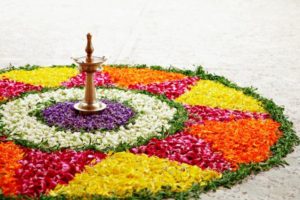Onam Pookkalam – Traditional way of making Atha pookalam
Onam – A harvest Festival – Beginning of the Celebrations floral carpets Onam Pookkalam
Onam Pookkalam – Onam is also a harvest festival. It is celebrated at a time when everything appears so nice and good. The beautiful landscape of Kerala can be seen in its full radiance at this time of the Malayalam New Year. Weather, it seems, also seeks to be a part of the festival. It contributes by becoming pleasantly warm and sunny. Fields look brilliant with a bountiful harvest. Farmers feel on top of the world as they watch the result of their hard labour with pride.
Onam Pookkalam – the exquisite flower mat starts from Atham day and continues till Thiruvonam
Celebrations of the first day are marked by intricate floral carpets called Pookalam. More flowers of different colours are added to this pookalam on each passing day. Girls take great delight in designing them in the front courtyards of their house. Boys take pleasure in helping them gather flowers.
Right from day one of the festival, called Atham colours begin to emanate from this ebullient festival. Making of Pookalam starts from this very day and continues till Thiruvonam. When the Aththa Poo reaches an overwhelming size and most elegant design. It’s a brilliant feeling to walk in the streets of Kerala at this time.
Buy Online green gram dal-cherupayar parippu payasam mix packs
Onam Pookkalam – Traditional way of making Atha pookalam
Pookalam is an intricate and colourful arrangement of flowers laid on the floor. The tradition of decorating Pookalam is extremely popular in Kerala and is followed as a ritual in every household during ten-day-long Onam celebrations.
‘Pookalam’ consists of two words, ‘poov’ meaning flower and ‘kalam’ means colour sketches on the ground. It is considered auspicious to prepare Pookalam, also known as ‘Aththa-Poo’ during the festival of Onam.
Basic design is prepared on the first day. The size of a Pookalam is increased by adding more to it on every passing day hence a massive Pookalam gets ready for the main day of the occasion. It’s a big creative task, as designers have to think of a new design ever day. Various flowers are used on each day as a specific flower is dedicated to each day of Onam.
Commonly used flowers include
- Thumba (Lucas Aspera)
- Kakka Poovu
- Thechipoovu
- Mukkutti (little tree plant)
- Chemparathy (shoe flower)
- Aripoo or Konginipoo (Lantana)
- Hanuman Kireedom (Red pagoda plant) and Chethi (Ixora).
Of all these flowers Thumba flowers are given more importance in Pookalam as they are small in size and glitter in soft rays of the sun.. ‘Thumba Poo’ is also considered to be the favourite flower of Lord Shiva and King Mahabali was a devout worshipper of Shiva.
Buy Online different versions of payasam mix packs
Making of a pookalam
ചിങ്ങത്തിലെ അത്തംനാൾ മുതലാണ് പൂക്കളം ഒരുക്കാൻ തുടങ്ങുന്നത്. അത്തം, ചിത്തിര, ചോതി എന്നീ ദിവസങ്ങളിൽ ചാണകം മെഴുകിയ നിലത്ത് തുമ്പപ്പൂവ് മാത്രമാണ് അലങ്കരിക്കുക. പിന്നീടുള്ള ദിവസങ്ങളിൽ വിവിധതരം പൂക്കൾ ഉപയോഗിക്കുന്നു. ആദ്യത്തെ ദിവസമായ അത്തംനാളിൽ ഒരു നിര പൂ മാത്രമേ പാടുള്ളൂ. ചുവന്ന പൂവിടാനും പാടില്ല. രണ്ടാം ദിവസം രണ്ടിനം പൂവുകൾ മൂന്നാം ദിവസം മൂന്നിനം പൂവുകൾ എന്നിങ്ങനെ ഓരോ ദിവസവും കളത്തിന്റെ വലിപ്പം കൂടി വരുന്നു. ചോതിനാൾ മുതൽ മാത്രമേ ചെമ്പരത്തിപ്പൂവിന് പൂക്കളത്തിൽ സ്ഥാനമുള്ളൂ. ഉത്രാടത്തിൻനാളിലാണ് പൂക്കളം പരമാവധി വലിപ്പത്തിൽ ഒരുക്കുന്നത്. മൂലം നാളീൽ ചതുരാകൃതിയിലാണ് പൂക്കളം ഒരുക്കേണ്ടത്.
ഒരു നിറത്തിലുള്ള പൂവിൽ തുടങ്ങി 10-ആം ദിവസം പത്തു നിറങ്ങളിലുള്ള പൂക്കൾകൊണ്ട് പൂക്കളം ഒരുക്കുന്നു. ചാണകം മെഴുകിയ വെറും നിലം കൂടാതെ, മണ്ണുകൊണ്ട് നിർമിച്ച ചാണകം മെഴുകിയ ചെറുമണ്ഡപവും പൂവിടുന്നതിന് ഉപയോഗിക്കുന്നുണ്ട്. തിരുവോണ ദിവസം രാവിലെ പൂക്കളത്തിൽ പലകയിട്ട് അരിമാവു പൂശി അതിന്റെ പുറത്ത് നാക്കിലയിട്ട് അരിമാവു പൂശുന്നു. മണ്ണുകൊണ്ടോ തടികൊണ്ടോ തൃക്കാക്കരയപ്പന്റെ വിഗ്രഹങ്ങൾ നിർമിച്ച് ഇലയിൽ പ്രതിഷ്ഠിക്കും. വിഗ്രഹങ്ങൾ പൂക്കൾ കൊണ്ട് അലങ്കരിക്കുകയും പാലട, പഴം, ശർക്കര തുടങ്ങിയവ നിവേദിക്കുകയും ചെയ്യുന്നു. ചതയം വരെ ദിവസത്തിൽ മൂന്നു നേരവും പൂജയുണ്ട്. കുടുംബത്തിലെ കാരണവരാണ് പൂജ നടത്തേണ്ടത്. ഓണം കാണാൻ എഴുന്നള്ളുന്ന തൃക്കാക്കരയപ്പനെ ആർപ്പുവിളിച്ചും കുരവയിട്ടും ആണ് സ്വീകരിക്കുന്നത്. ചതയം കഴിഞ്ഞ് ഏതെങ്കിലും നല്ല ദിവസം നോക്കി പ്രതിഷ്ഠ ഇളക്കുന്നു; മിക്കവാറും ഉത്തൃട്ടാതി നാളിലായിരിക്കും.






















